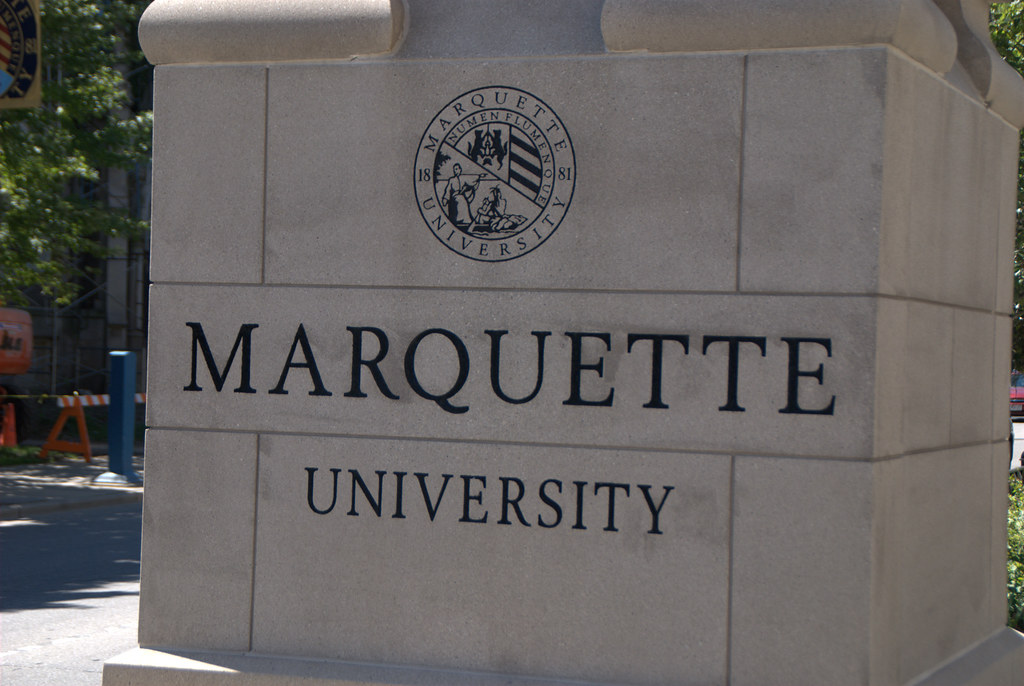Marquette University Refuses Union Recognition on Religious Grounds
University relying on religious freedom protections to side step union election.

Marquette University. Photo by Ed Bierman. (CC BY 2.0) https://creativecommons.org/licenses/by/2.0/
Marquette University leaders are invoking a religious exemption in federal labor law to not recognize a unionization effort by non-tenured faculty.
Dozens of non-faculty employees from the university’s Klingler College of Arts and Sciences have spent most of the past year organizing a union with the United Campus Workers of Wisconsin (UCW-WI). Most of the non-faculty staff have signed cards authorizing UCW-WI to represent them, according to the union. The staff are organizing around “unfair wages, short-term contracts, and increasing workloads as some of the concerns that motivated them to unionize,” according to the union.
But the university is refusing to recognize the union and is invoking a religious exemption to sidestep a National Labor Relations Board (NLRB) union election. The NLRB has held that religious institutions are exempt from board oversight “under a broad interpretation of religious freedom,” according to Fisher Phillips, a national law firm that specializes in labor and management law.
“To protect the direct relationship with our faculty that is critical to our Catholic, Jesuit intellectual life at Marquette, the university is invoking its legal right for a religious exemption from National Labor Relations Board oversight,” wrote Acting president and provost Dr. Kimo Ah Yun and vice president and general counsel Ralph Weber in an open letter to students and staff.
Ah Yun and Weber said the university’s 143-year history as a “Catholic, Jesuit institution” entitled it to the exemption.
“Ultimately, the religious exemption is about the Constitution’s First Amendment protection of religious freedom from government regulation — widely regarded as one of America’s most important rights,” they wrote.
The union responded with an editorial in the student newspaper, pointing to Catholic institutions and leaders, like Pope Francis, who have expressed support for unions.
“We ask university leadership to open their hearts and minds to the ways unionization may strengthen the university’s Catholic, Jesuit identity and ministry, rather than remaining committed to the spurious idea that our Catholic, Jesuit identity and values preclude collective bargaining with faculty,” the union wrote.
University leaders say the institution and its students are “best served by working collaboratively with all our faculty,” and they characterized the union as an outside third party.
This framing of unions as a “third party” is common in unionization opposition, as is the importance placed on maintaining the status quo that workers are organizing against.
Ah Yun and Weber wrote that the university has taken action to improve employment conditions for non-tenure track faculty. The university has even implemented a number of changes the university has made in recent years relative to employment contracts, pay, promotion and professional development.
The union continues to push its legitimacy and has found support for its campaign among some students and staff. It recently delivered two petitions — one signed by students another by tenured-faculty — calling for recognition from the university.
Correction: The story originally said “the university’s 147- year history”, it has been corrected to reflect Marquette’s 143-year history.
If you think stories like this are important, become a member of Urban Milwaukee and help support real, independent journalism. Plus you get some cool added benefits.





















Ahem….now where did I put that danged Sermon on the Mount again?
I think St. Ignatius would challenge the statement that somehow a union would undermine the historical Jesuit intellectual tradition which continually challenged the status quo and supported the admonitions in Matthew 25. Using the Jesuit tradition as an excuse to block a union is a form of apostasy to the teachings of St. Ignatius.
Wow! Who would Jesus screw?
If Marquette was truly believes that this union will inhibit direct communication, then the institute should have listened to these employees. In fact, Marquette simply doesn’t want to have to share power with the less prestigious employees. Each time Marquette has dug its heals against efforts to treat employees more equitably, they’ve lost.
There was a time when Marquette was a center of liberation theology. It’s so sad to see this Jesuit institution abandon its moral and ethical foundation in its treatment of its employees.
Interesting how my Alma Mater never argues against its federal tax exempt status, against taking federal research dollars, or against benefitting from federally funded grants, loans, and work-study programs based on its “religious freedom.” There are plenty of regulations tied to each of these benefits and I would hate for Marquette to feel compromised or otherwise put upon. A line must be drawn.
Oh, no, if there are tax dollars to be had, ol’ MU is right there in line.
“Render unto Caesar the things that are Caesar’s,”
like say, uniform application of labor law.
If your religious message is not compromised,
quit whining – fair treatment of employees
(Do unto others) is exemplary, not punitive.
In 1891 Pope Leo XIII wrote an encyclical titled Rerum Novarum. The Rights and Duties of Capital and Labor. Number 49 reads: “The most important of all are workingmen’s unions, for these virtually include all the rest. History attests what excellent results were brought about by the artificers’ guilds of olden times. They were the means of affording not only many advantages to the workmen, but in no small degree of promoting the advancement of art, as numerous monuments remain to bear witness. Such unions should be suited to the requirements of this our age – an age of wider education, of different habits, and of far more numerous requirements in daily life. It is gratifying to know that there are actually in existence not a few associations of this nature, consisting either of workmen alone, or of workmen and employers together, but it were greatly to be desired that they should become more numerous and more efficient. We have spoken of them more than once, yet it will be well to explain here how notably they are needed, to show that they exist of their own right, and what should be their organization and their mode of action.”
And the Pope has spoken.